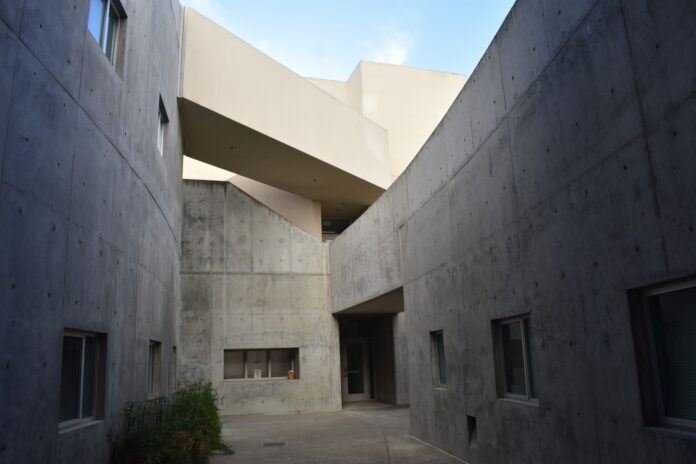How the “Death Star” got its nickname and tips to avoid getting lost in its halls
By JALAN TEHRANIFAR — features@theaggie.org
The Social Sciences and Humanities building is known for reining terror upon the lost and confused college students who roam its halls. The maze-like building is said to be nicknamed “The Death Star,” alluding to the space station in the Star Wars movies, due to its puzzling nature and concrete walls.
The building’s architecture is quite different from that of many campus buildings, with many dead-ends, staircases to nowhere, underground classrooms, slanted hallways, towers that do not connect, emergency ‘panic’ buttons and glass walls. Students say that they have often found doors on their usual routes to class randomly locked, and rumor has it that these locked doors rotate every so often, catching students off guard once they think they have finally found their way around.
It was built in 1994 and designed by Antoine Predock, a notable architect who has been publicly awarded for his unconventional designs. Much of Predock’s work was inspired by the “cultural roots” already laid in the places he was designing, according to Westbury Garden Rooms. He would come up with his often unusual layouts based on the natural conditions of a site and the “spiritual aura” that he felt there. Oftentimes, Predock’s designs tell a story — and the one about the “Death Star” is debated to this day.
Roni Ayalon, a third-year political science major, shared that the most prominent rumor that circles campus is that Predock purposely designed the building to be a confusing environment as a social experiment.
Ekaylah Rampola, a third-year genetics and genomics major, said that she has also heard people theorize that the building is meant to be confusing.
“I’ve heard through other students that it was built purposely to be super confusing as a social experiment. I’ve never actually 100% confirmed this was true, but it makes sense since it’s the complex for the social sciences and humanities departments,” Rampola said. “It was a way to get people to interact with each other by asking for directions.”
Rampola explained that since the building houses many social science and humanities departments, she has been told that the building was created with such complex and irregular halls, stairwells and walls so that students wander into different wings of the massive building by accident.
UC Davis Alumna Savannah Holmes also discussed this theory in a 2013 article published by The California Aggie. She suggested that the lack of maps and signage, and seemingly randomly locked doors, creates an environment that forces people to ask for directions if, and when, they get lost, fostering interaction between students with different majors.
Others suggest that the building is set up like a game: enter and exit through the right “portals” without getting lost or asking for help to complete the challenge.
Some say that the industrial complex was built to look like the state of California from a birds-eye view, which seems to have some truth to it, according to Predock’s website. The site says that the shape of the building is a metaphor for Perdock’s view of California — which might make it difficult for others to see, even if looking at it from a bird’s-eye view.
Ultimately, none of these students have been able to prove any one theory for sure — or make it through their time at Davis without getting lost in the “Death Star” themselves. Rampola said that she has gotten lost in the “Death Star” on multiple occasions.
“One day, a few of my friends and I went to get some dinner at I-Tea downtown, and as we were trying to make our way back to the dorms, we decided that we wanted to cut through the ‘Death Star’ instead of going around it, thinking that it would cut our walk a tad bit shorter,” Rampola said. “We entered through the staircase that was right across the street from I-Tea, and wandered around for a while. Thinking that we had reached the other side […] we went up another staircase only to end up right back where we started. There were maybe five or six of us there that night, and no one realized that we had made a gigantic U-turn through the Death Star until the end.”
Madison Xiong, a second-year biological sciences major, said she also got lost in the Death Star trying to find her classroom.
“On the first day of school, I came up [to the ‘Death Star’] and had no idea where I was going,” Xiong said. “I was late, so everyone was staring at me as I entered… I was freaking out.”
Aiperi Aruueva, a second-year biochemistry and molecular biology double major, also shared her first encounter in the “Death Star,” looking for room 110.
“On the first day, I was looking for a class but because there’s construction sites, I didn’t know [one hall was] an exit, so I walked around and I went through,” Aruueva said. “There’s a sign that says 110, but the sign pointed up so I went upstairs. I was walking through the halls and through the empty bridge things. I somehow ended up finding the place.”
Even though rumor has it that the floors have tear-stains from the disoriented students of years past, that hasn’t stopped students from making the Social Sciences and Humanities building the meeting place for clubs and late night shenanigans, according to Rampola.
She described a game of “Sardines,” which is the reverse of hide-and-seek, that she and her friends played in the building once.
“I ended up being the last seeker who couldn’t find the spot,” Rampola said. “As the group in the hiding spot grew, my friends started making noises and even sending me videos of things around the location they were at, [but] I still couldn’t find them. After maybe like an hour and a half, we gave up, and the group used Find-My-iPhone to find me.”
The Davis Nerf club also meets at the “Death Star” every Saturday at 7 p.m. to play a series of “NERF games.”
Many new and returning students even celebrated the re-opening of campus by playing a game of hide-and-seek at midnight in the “Death Star” during orientation week. The many twists and turns of the huge building make it a great place for getting lost, and trying not to be found.
Though the Social Sciences and Humanities building may be confusing and daunting to new students, every Aggie should explore it at some point. But, if entering at night, bring a flashlight, because rumor has it if you get lost after dark, you may never find your way out.
Written by: Jalan Tehranifar — features@theaggie.org



